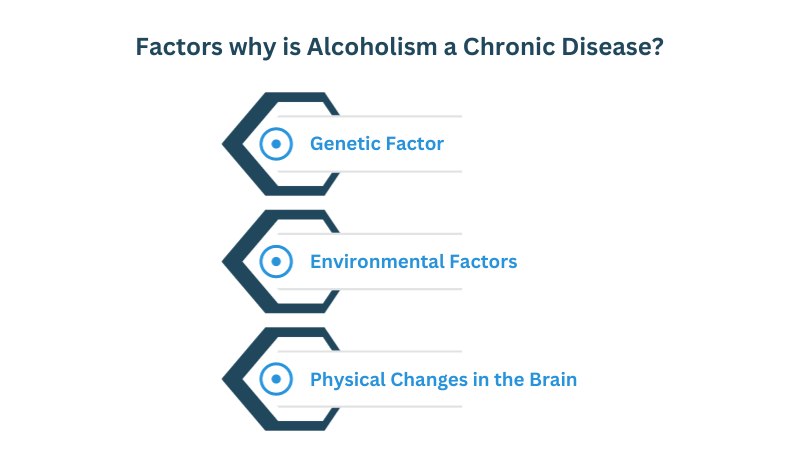
What is Patient Centered Care? Why is it Important?
What is Patient Centered Care? Why is it Important? In the healthcare world, one term has risen above the rest, and for good reason: patient-centered

Drinking alcohol is considered a bad habit, but more than that, it is a chronic disease that affects millions of people around the world. The World Health Organization (WHO) estimates that around 3 million deaths every year are caused by alcohol abuse and addiction. Alcoholism not only affects the individual who drinks but also impacts their loved ones and society as a whole.
The classification of alcoholism as a chronic disease is still debated by many, but there are several reasons why it is considered as such. In this blog, we will explore the definition of a chronic disease, the characteristics of alcoholism, and how they fit into the criteria of being a chronic disease.
A chronic disease is defined as a long-lasting condition that can be controlled but not cured. It is a condition that persists over time and requires ongoing management and treatment to prevent complications and maintain quality of life. Examples of chronic diseases include diabetes, heart disease, and asthma.
Alcoholism, also known as alcohol use disorder (AUD), is a pattern of drinking that causes significant impairment or distress. It is a chronic condition that involves compulsive and uncontrollable alcohol consumption, even in the face of negative consequences.
People with alcoholism may experience a loss of control over their drinking, tolerance to alcohol, and withdrawal symptoms when they stop drinking. They may also continue to drink despite knowing the harmful effects it has on their health and relationships.
The definition of chronic disease is a thing that persists over a long period of time and requires ongoing management; alcoholism can be categorized as such. Alcoholism is a progressive disease, meaning it gets worse over time without proper treatment. It is also a relapsing disease, which means that even if an individual stops drinking for a period of time, they may still struggle with cravings and potentially relapse back into unhealthy drinking.
Research from the American psychiatric Association has also identified the genetic and environmental factors that contribute to the development of alcoholism, further classifying it as a chronic disease. Additionally, studies have shown that excessive alcohol consumption can cause changes in brain chemistry and function, making it difficult for individuals to control their drinking behavior. In light of factors like genetics, environmental factors, and physical changes in the brain, it is clear that alcoholism meets the criteria for a chronic disease

Like diabetes and heart diseases , there is a genetic component to alcoholism. Studies have shown that individuals with a family history of alcoholism are more likely to develop the disorder themselves. This suggests that genes play a role in determining an individual’s risk for developing alcohol use disorder.
Environmental factors also play a significant role in the development of alcoholism. Exposure to peer pressure, stressful life events, and easy access to alcohol are some examples of environmental influences that can contribute to the development of alcohol use disorder.
Excessive alcohol consumption can cause changes in brain chemistry and function. These changes can affect an individual’s decision-making, impulse control, and ability to regulate emotions. This makes it difficult for individuals with alcoholism to stop drinking, even when they are fully aware of the negative consequences.
Mental disorder refers to the changes in an individual’s emotions, thinking patterns, or behaviors that create significant distress and affect their daily functioning. So when you feel that alcoholism would also lie in this category? The simple answer is yes, it does.
According to the AMA, Alcoholism is counted under both the medical and psychiatric sections. Some of the most common mental health disorders that co-occur with alcoholism include depression, anxiety, and bipolar disorder. The relationship between these conditions is complex and often referred to as a dual diagnosis.
People with alcoholism may drink to cope with uncomfortable emotions or try to self-medicate underlying mental health issues. However, this can worsen the symptoms of both alcoholism and mental illness.
The main reason that alcoholism is considered a chronic disease is because it can have lasting effects on an individual’s health, relationships, and overall quality of life. Some common signs of alcohol use disorder include:
While alcoholism is a chronic disease, it can be managed and treated with the right interventions and support. If you or a loved one is struggling with alcoholism, it is important to seek professional help from a healthcare provider or addiction specialist.
Treatment for alcoholism may include therapy, medication-assisted treatment, and support groups. It is also essential to address any underlying mental health disorders that may be contributing to the alcohol use disorder.
Remember, recovery from alcoholism is a journey and requires ongoing management. With the right support and treatment, individuals can overcome their addiction and live a fulfilling life in sobriety. It is never too late to seek help and make positive changes for your health and well-being. So, if you or someone you know is struggling with alcoholism, do not hesitate to reach out for help. Remember, you are not alone, and there is always hope for a better future.
Let’s break the stigma surrounding alcoholism and promote understanding and support for those suffering from this chronic disease. Together, we can make a difference in the lives of individuals with alcohol use disorder. Stay strong, stay hopeful, and seek help when needed. Recovery is possible.

What is Patient Centered Care? Why is it Important? In the healthcare world, one term has risen above the rest, and for good reason: patient-centered

What Does A Low Temperature Mean? Could It Be Hypothermia Shivering hands, chattering teeth, and the desperate hunt for another blanket – we’ve all experienced
Talk to an Expert Now